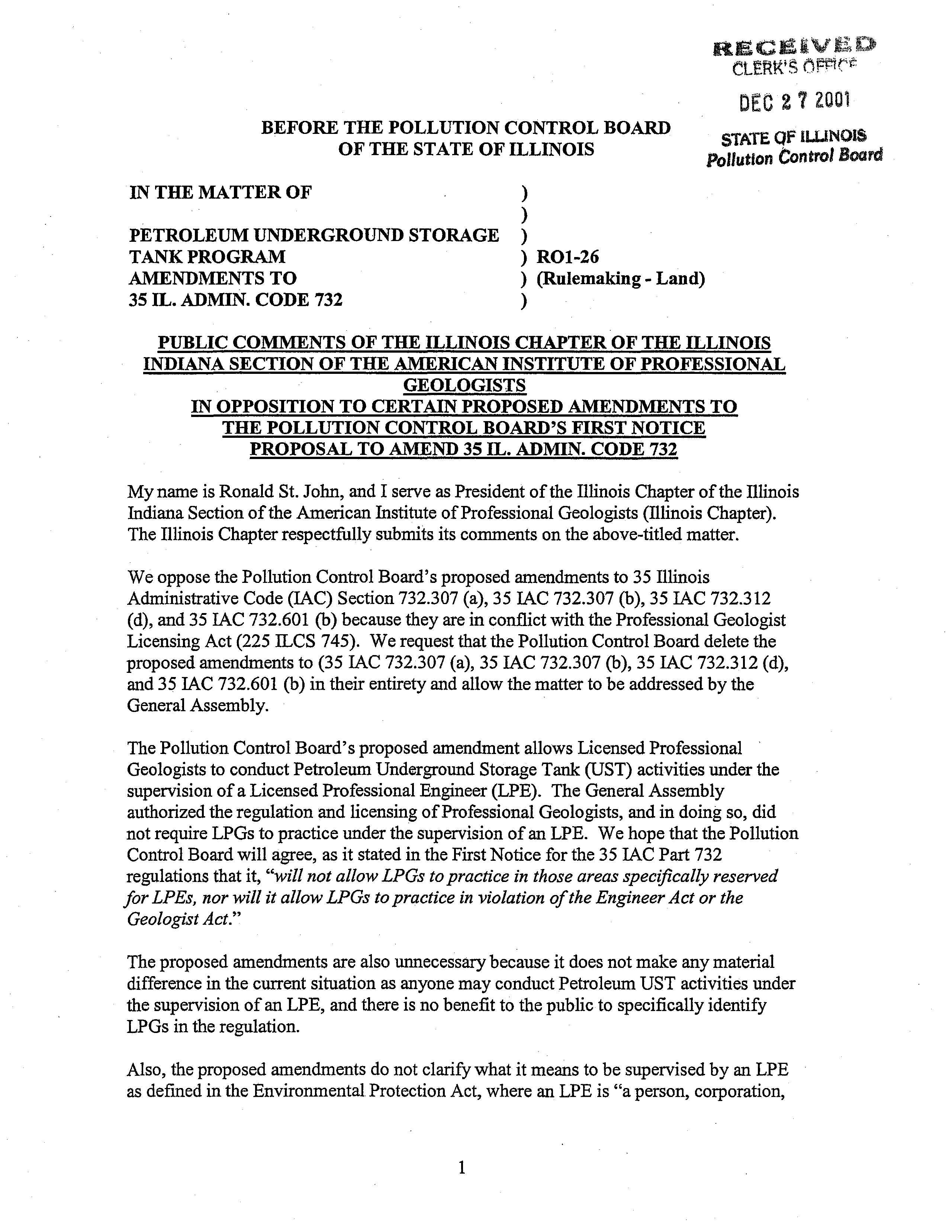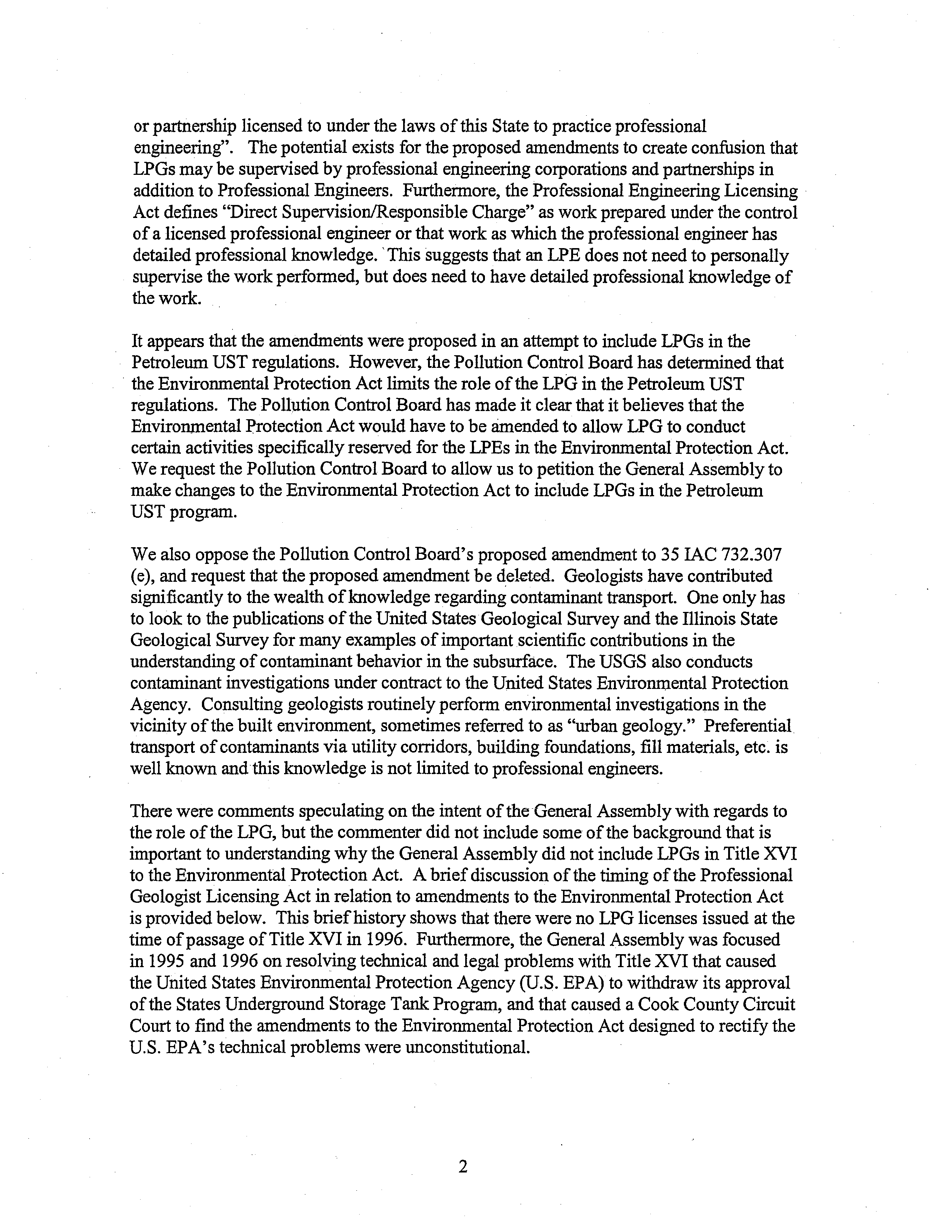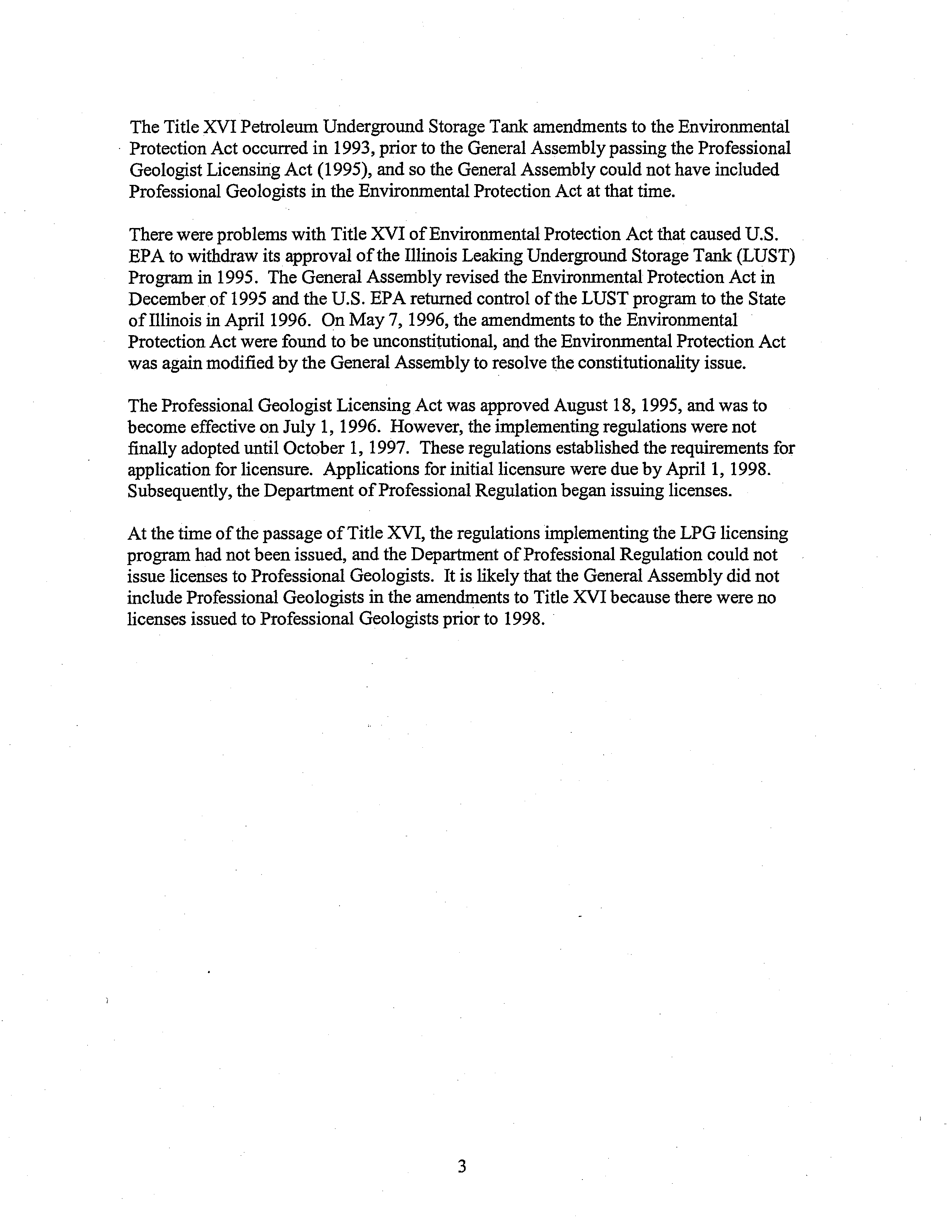RECEIVED
CLERK’S
OFFICE
DEC
2
7
2001
STATE QF ILLINOIS
BEFORE
THE ILLINOIS POLLUTION CONTROL
~
Control Board
IN THE MATTER OF:
)
)
)
PETROLEUM UNDERGROUND STORAGE
)
TANK PROGRAM
AMENDMENTS
TO
)
35
IL. ADMIN. CODE
732
)
)
RO1-26
(Rulemaking
-
Land)
~e
~i/
~—
NOTICE OF
FILING
TO:
Ms. DorothyM. Gunn
Clerk ofthe Board
Illinois Pollution
Control Board
James R. Thompson Center
100 West Randolph Street
Suite 11-500
Chicago, illinois 60601
(VIA
FEDEX
-
OVERNIGHT)
Mr. Joel J. Stemstein
Hearing Officer
illinois Pollution Control Board
James R. Thompson Center
100 WestRandolph Street
Suite 11-500
Chicago, Illinois 60601
(VIA FEDEX
-
OVERNIGHT)
All Other Persons on the Attached Service List (U.S. Postal Service)
PLEASE TAKE NOTICE that
today I have filed with the Office ofthe Clerk of
the Pollution Control Board the attached Public Comments ofthe Illinois Chapter ofthe
American Institute ofProfessional Geologists in the above-titled matter, a copy ofwhich
arehereby served upon you.
Respectfullysubmitted,
ILLINOIS CHAPTER
AMERICAN INSTITUTE OF
PROFESSIONAL GEOLOGISTS
Dated: December 21, 2001
Illinois Chapter, ATPG
Clayton Group Services
3140 Finley Road
Downers Grove, illinois
60515
(630) 795-3200
By:
Ronald B. St. JohhJ~resident
REcV
eL~flt~’S.
~
DEC
2?
ZUOl
BEFORE THE POLLUTION CONTROL BOARD
STATE
QF ILLINOIS
OF THE STATE OF ILLINOIS
pIlttofl
bontrol
Board
IN
THE
MATTER OF
)
)
PETROLEUM UNDERGROUND STORAGE
)
TANK PROGRAM
)
RO1-26
AMENDMENTS
TO
)
(Rulemaking
-
Land)
35
IL. ADMIN. CODE 732
)
PUBLIC COMMENTS
OF
THE
ILLINOIS CHAPTER OF THE ILLINOIS
INDIANA SECTION OF THE
AMERICAN
INSTITUTE OF PROFESSIONAL
GEOLOGISTS
IN OPPOSITION TO CERTAIN PROPOSED AMENDMENTS TO
THE POLLUTION CONTROL BOARD’S FIRST NOTICE
PROPOSAL TO AMEND 35 IL. ADMIN. CODE 732
Myname is Ronald
St. John, and I
serve as President
ofthe Illinois Chapter ofthe
Illinois
Indiana Section ofthe American Institute ofProfessional Geologists (Illinois Chapter).
The Illinois Chapter respectfully submits its comments on the above-titled matter.
We oppose the Pollution Control Board’s proposed amendments to 35
illinois
Administrative
Code (IAC) Section 732.307 (a), 35 JAC
732.307 (b), 35 IAC 732.312
(d), and 35 IAC 732.601
(b) because they are in conflictwith the Professional Geologist
Licensing Act (225 ILCS
745).
We request that the Pollution Control Board delete the
proposed amendments to
(35
JAC 732.307 (a), 35 IAC 732.307 (b), 35 IAC 732.3 12 (d),
and 35 IAC 732.601 (b) in their entirety and allow the matter to be addressed by the
General Assembly.
The Pollution Control Board’s proposed amendment allows Licensed Professional
Geologists to conduct Petroleum Underground Storage Tank (UST) activities under the
supervision ofa Licensed Professional Engineer (LPE).
The General Assembly
authorized the regulation and licensing ofProfessional Geologists, and in doing so, did
not require LPGs to practice under the supervision ofan LPE.
We hope that the Pollution
Control Board will agree, as it stated in the First Notice for the 35 IAC Part 732
regulations that it,
“will not allowLPGs to practice in those areas spec~fIcally
reserved
for LPEs,
norwill it allowLPGs to practice in violation ofthe EngineerAct or the
Geologist Act.”
The proposed amendments are also unnecessarybecause it does not make any material
difference in the current situation as anyone may conduct Petroleum UST activities under
the supervision ofan LPE, and there is no benefit to thepublic to specifically identify
LPGs in the regulation.
Also, the proposed amendments do not clarify what itmeans to be supervised by an LPE
as defined in the Environmental Protection Act, where an LPE is “a person, corporation,
1
or partnership licensed to
under the laws ofthis State to practice professional
engineering”.
The potential exists forthe proposed amendments to create confusion that
LPGs maybe supervised by professional engineering corporations and partnerships in
addition to Professional Engineers.
Furthermore, the Professional Engineering Licensing
Act defines “Direct Supervision/Responsible Charge” as work prepared under the control
ofa licensed professional engineer or that work as which the professional engineer has
detailed professional knowledge.
This suggests that an LPE does not need to personally
supervise the workperformed, but does need to have detailed professional knowledge of
the work.
It appears that the amendments were proposed in an attempt to include LPGs in the
Petroleum UST regulations.
However, the Pollution Control Board has determinedthat
the Environmental Protection Act limits therole ofthe LPG in the Petroleum UST
regulations.
The Pollution Control Board has made it clear that it believes that the
Environmental Protection Act would have to be amended to allow LPGto conduct
certain activities specifically reserved for the LPEs in the Environmental Protection Act.
We request the Pollution ControlBoard to allow us to petition the General Assembly to
make changes to the Environmental Protection Act to include LPGs in the Petroleum
UST program.
We also oppose the Pollution
Control Board’s proposed amendment to 35 JAC 732.307
(e), and request that the proposed amendment be deleted.
Geologists have contributed
significantly to the wealth ofknowledge regarding contaminant transport.
One only has
to look to the publications oftheUnited States Geological Survey and the Illinois State
Geological Survey for many examples ofimportant scientific contributions in the
understanding ofcontaminant behavior in the subsurface.
The USGS also conducts
contaminant investigations under contract to the United States Environmental Protection
Agency.
Consulting geologists routinely perform environmental investigations in the
vicinity ofthe built environment, sometimes referred to as “urban geology.”
Preferential
transport ofcontaminants via utility corridors, building foundations, fill materials, etc~
is
well known andthis knowledge is not limited to professional engineers.
There were comments speculating on the intent of the General Assembly with regards to
the role ofthe LPG, but the commenter did not include some ofthe background that is
important to understanding why the General Assembly did not include LPGs in Title XVI
to the Environmental Protection Act.
A brief discussion ofthe timing ofthe Professional
Geologist Licensing Act in relation to amendments to the Environmental Protection Act
is provided below.
This briefhistory shows that there were no LPG licenses issued
at the
time ofpassage ofTitle XVI in 1996.
Furthermore, the General Assembly was focused
in 1995 and
1996 on resolving technical and legal problems with Title XVI that
caused
the United States Environmental Protection Agency (U.S. EPA) to withdraw its approval
ofthe States Underground Storage Tank Program, and that caused a Cook County Circuit
Court to find the amendments to
the Environmental Protection Act designed to rectify the
U.S. EPA’s technical problems were unconstitutional.
2
The Title X\TI Petroleum Underground Storage Tank amendments to the Environmental
Protection Act occurred in
1993, prior to the General Assembly passing the Professional
Geologist Licensing Act
(1995),
and so the General Assembly could not have included
Professional Geologists in the Environmental Protection Act at that time.
There were problems with TitleXVI ofEnvironmental Protection Act that caused U.S.
EPA to withdraw its approval ofthe Illinois Leaking Underground Storage Tank (LUST)
Program in
1995.
The General Assembly revised the Environmental Protection Act in
Decemberof
1995
and the U.S. EPA returned control ofthe LUST program to the State
ofIllinois
in April
1996.
On May 7,
1996, the amendments to the Environmental
Protection Act were found to be unconstitutional, and the Environmental Protection Act
was againmodified by the General Assembly to resolve the constitutionality issue.
The Professional Geologist Licensing Act was approved August 18,
1995,
and was to
become
effective on July
1,
1996.
However, the implementing regulations were not
finally adopted until October 1,
1997.
These regulations established the requirements for
application forlicensure.
Applications forinitial licensure were due by April
1,
1998.
Subsequently,the Department ofProfessional Regulation began issuing licenses.
At the time ofthe passage ofTitle XVI, the regulations implementing the LPG licensing
program had not been issued, and the Department ofProfessional Regulation could not
issue licenses to Professional Geologists.
It is likely that the General Assembly did not
include Professional Geologists in the amendments to Title XVI because there were no
licenses issued to Professional Geologists prior to
1998.
3




